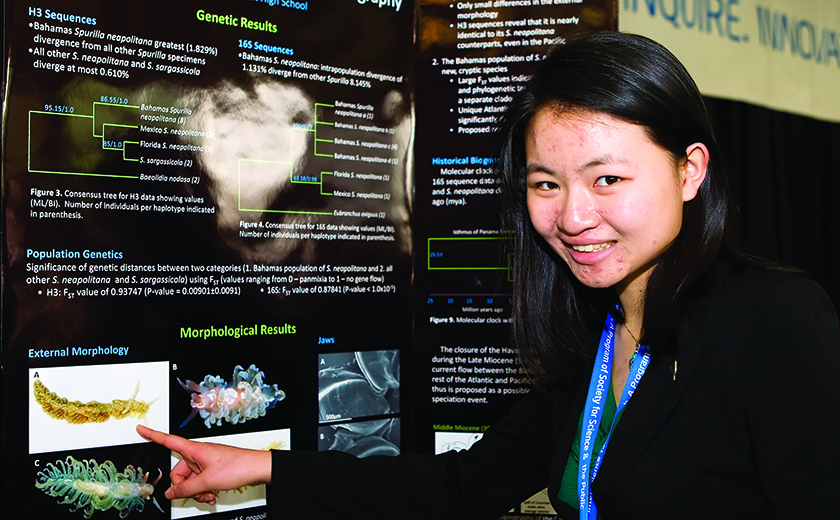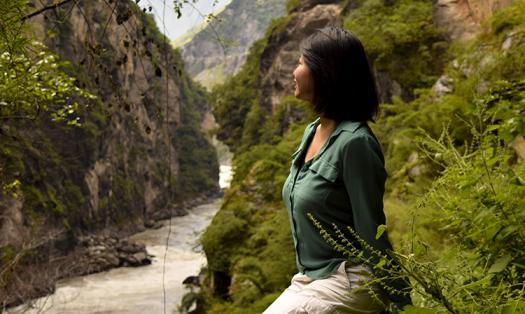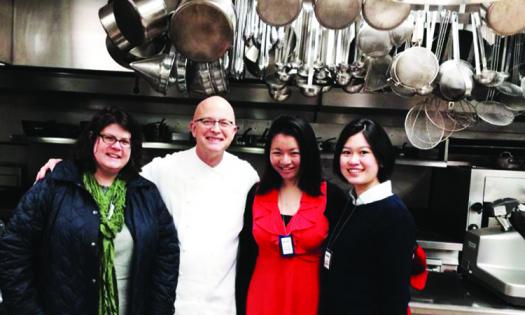Alumni, ISEF, Science Talent Search
Creating change by communicating science to the public

Bonnie Lei, an Intel STS and Intel ISEF 2011 finalist, has been named a 2016 Schwarzman Scholar. Bonnie has traveled the world: conserving penguins in South Africa, discovering a new sea slug species in the Caribbean, and innovating sustainable agriculture education in Uganda.
Now she’s heading to Beijing to study environmental policy. The Schwarzman Scholar program offers a one-year Master’s Degree at Tsinghua University in Beijing – one of China’s most prestigious universities.
Participating in events like Intel STS and Intel ISEF showed Bonnie that the first step to create tangible change is to communicate scientific research done in the lab to society.
Bonnie has previously been a Booth Fellow in Myanmar, where she helped to found the Wildlife Conservation Society’s marine conservation program and designed environmental education initiatives. She graduated manga cum laude from Harvard University in 2015 with an A.B. in Organismic and Evolutionary Biology.

You’re heading to Beijing to study environmental policy as a Schwarzman Scholar. What are you most excited about for this program?
Schwarzman Scholars is one of the most selective postgraduate programs in the world. It is an incredible honor to be selected for an inaugural class identified as the most influential global leaders of tomorrow. I’m excited to amplify my public policy and leadership skills as a Schwarzman Scholar, maximizing my ability to be an interdisciplinary conservation leader for local communities as well as international non-governmental organizations (NGOs).
Environmental policy must be made with a grounding in rigorous science research, and I’m grateful that Schwarzman Scholars recognizes the interdisciplinary value of a scientist training in public policy. It is a particularly interesting time to study environmental policy in China. The country has incredible influence on natural resources regionally and globally, and is starting to take a serious stance on environmental protection measures.
I am so excited to learn and adventure in China alongside these 110 diverse fellow scholars! Follow me at @lei_bonnie on Twitter for updates on my Schwarzman year.
Tell us about working in marine conservation and describe your role at the Wildlife Conservation Society. Why did you decide to work in Myanmar?
I am currently working at Wildlife Conservation Society (WCS) Myanmar as a Harvard Alex G. Booth Fellow. After graduating in 2015, I knew I wanted to work on an interdisciplinary, on-the-ground conservation project. I was lucky enough that WCS welcomed me and gave me exactly this type of opportunity! I’m leading a shark conservation and sustainable fisheries project on Myanmar’s western coast that ties together community development work, socioeconomic analyses, and rigorous scientific data collection.
Environmental policy must be made with a grounding in rigorous science research.
Myanmar is a particularly special place in my heart because my grandmother is originally from there. Since the dissolution of the military junta in 2011, foreign investments and development interests have skyrocketed — making it a particularly important time to build environmental sustainability measures for the country. I believe I am truly working in the right place at the right time!

How did you first become interested in science?
I fell in love with the sea as I grew up next to the Pacific Ocean, and after taking a college oceanography course while in middle school, I was hooked! I was lucky enough to find a newly hired professor at the local university who was willing to take me under his wing. He happened to be one of the world’s few sea slug experts, and while helping him set up his lab, I was soon conducting my own research projects.
You’ve been traveling the world for science. Tell us where you’ve been this year.
I have traveled to Qatar and Spain as a Learners’ Voice Fellow for the World Innovation Summit for Education. I was recognized as one of 33 young global leaders in education for my experience in STEM and environmental education (including my work with The Food Lab for Kids, previously profiled in this feature).
As a global ambassador for the Thought for Food Challenge, I traveled to Portugal to contribute solutions on a big question: how can we sustainably feed 9 billion people by 2050?
Participating in events like Intel STS, Intel ISEF, and other conferences, I saw how the first step for creating tangible change is to communicate results from the lab and field to society.
What was your most memorable experience at Intel STS and ISEF? Describe your project(s).
At Intel STS, we were treated like stars for a few days, from shaking hands with President Obama to all sorts of press interviews. But my favorite part was spending time with the other finalists. I remember most the crazy scavenger hunt on the Mall and the late night sing-alongs. As an undergrad I still got to see many of the finalists, whether at school or during special meet-ups and reunions. In that way, I was lucky that the spirit of finalist week has never ended for me!
For the project I presented at Intel STS, I conducted the first detailed anatomical and genetic study of a sea slug family, resulting in the discovery of a new sea slug species and some interesting implications for marine biodiversity and conservation.
Did your involvement in Intel STS or ISEF influence you to pursue opportunities in STEM or promote STEM to others?
Early exposure to original science research gave me the dream of being the next great environmental scientist. But while participating in events like Intel STS, Intel ISEF, and other conferences, I saw how the first step for creating tangible change is to communicate results from the lab and field to society.
Achieving effective conservation results means taking an action-oriented approach to my scientific research through policy-making, community development, and environmental education. This is why I am so excited to amplify my public policy and leadership skills as a Schwarzman Scholar, so I can maximize my ability to be an interdisciplinary conservation leader for local communities as well as international NGOs.
What is your advice to young people interested in science and math?
However cheesy or trite it may sound, it really is true: follow your passions and great things will happen. I spent four years of my life poking at the innards of sea slugs because that’s what I loved to do. And now the humble sea slug, a backboneless invertebrate, has formed the backbone for all I have done since!


